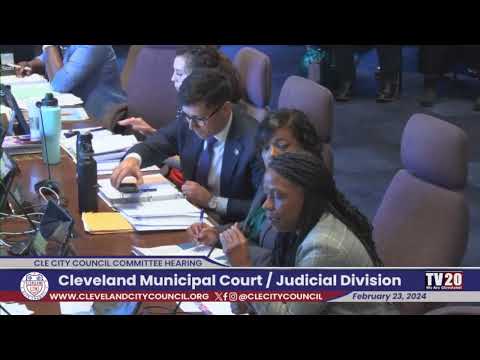Council congratulates city’s finance director on new bundles of joy
Updated 4:50 p.m. | Dakotah Kennedy
For those of you still playing Signal’s 2024 Budget Bingo, Council Member Jenny Spencer acknowledged the recent birth of Finance Director Ahmed Abonomah’s twins. Catch the exchange below.
Council wrapped its fourth day of hearings Friday and will resume Monday (Feb. 26) at 9 a.m.
The proof is not in the potty… yet
Updated 4:15 p.m. | Dakotah Kennedy
The city has several “port-a-loos” that have been in storage for more than two years, according to Council Member Stephanie Howse-Jones. Port-a-loos are portable “loos” – or bathrooms – that are open to the public in places like parks.
The city has stalled making a decision on how to pay for the water, according to Howse-Jones. She said she wants a resolution to make sure the bathrooms are available to unhoused residents instead of sitting in storage.
“This should be a service we provide,” she said, noting that the city is already paying to clean up human waste.
Utilities Chair and Ward 16 Council Member Brian Kazy said he didn’t know about the issue until Howse-Jones raised it. Kazy promised to address Howse-Jones’ concerns at the next utilities meeting.
Howse-Jones asked how the city figures out how to pay for water when people don’t pay their utility bills.
“How do we get water paid for?” she asked the Utilities Department.
While there are programs for residents who need financial support with utility bills, there was not an immediate answer.
The only hold up right now is the utilities department, according to Council Member Kerry McCormack.
$1.5 million in utilities relief distributed as a part of amnesty program

Updated 3:30 p.m.| Signal Cleveland
The utilities department’s chief financial officer, Catherine Troy, told council members that the department has distributed $1.5 million as part of the Utility Amnesty Program. In 2023, City Council approved spending $2 million using federal COVID-19 relief money to help customers who are at risk of having their electricity or water shut off because of overdue bills. The program’s guidelines require customers to enroll in utility payment arrangements and to have been negatively affected by the COVID-19 pandemic.
Troy said $587, 000 helped pay water bills and $856,000 went toward electric bills. About $500,000 is left to dole out.
Council Member Joe Jones asked how the money was distributed throughout the city’s neighborhoods. Troy said she didn’t have that information, but Council Member Brian Kazy said Cleveland Public Power primarily services the city’s East Side.
Read more in Cleveland Documenter Carolyn Cooper’s notes from a recent Utilities Committee meeting.
Feedback needed? City Council talks to Housing Court about Residents First
Updated 2:39 p.m.| Dakotah Kennedy
In February, council passed Residents First, a set of rules designed to overhaul housing code enforcement. But Housing Court Administrative Justice Moná Scott told council she has some concerns about the legislative package.
“It looks pretty on paper, but how does it work out?” she asked.
Scott said she has seen all of the “imperfections” and is worried about staffing levels. There are only four housing court prosecutors, and three of them are new employees, said Scott.
One key change from Residents First involves the civil ticketing process. Now, building inspectors can issue a $200 civil ticket instead of taking landlords to Housing Court.
“The civil sanctions don’t make sense to me,” said Scott.
The city has a hard enough time enforcing criminal cases, according to Scott. For example, Scott mentioned a 2023 case with 25 tickets on one property. The owner has never appeared in court, she said.
Polensek invited Scott to give council feedback on Residents First, which requires property owners and landlords to designate a local agent in charge in hopes of making it easier to hold unresponsive landlords accountable.

City Hall changes how it displays staffing figures in this year’s budget (and some people don’t like it)

Updated 1:50 p.m.| Nick Castele
Think fast: How many garbage truck drivers work for the City of Cleveland? During budget season, that’s more than trivia.
And this year, a change in the way Mayor Justin Bibb’s budget displays staffing figures has aroused some indignation on City Council.
The 2024 budget is different. Gone are the laundry lists of jobs and pay scales. Instead, the budget tallies the city head count on a series of color-coded organizational charts. But it doesn’t say specifically how many positions are vacant for each classification.
This year, each division has a number of generic vacancies that it can deploy as it needs. The change will help city officials be more flexible in making hiring decisions, Finance Director Ahmed Abonamah has argued.
Council doesn’t like losing the granular detail on staffing and pay. The change, they say, complicates their job of watchdogging the administration.
“Now you can’t figure out heads from tails here,” Polensek said during this week’s hearings. “Sometimes I think, somehow, they don’t want us to figure out here who’s working where and what they’re making. And it’s so frustrating that I got to use a magnifying glass on the org chart.”
Read more from Signal Cleveland’s Nick Castele.
‘Terrible, terrible move’: Council members concerned about jail and courts going to Garfield Heights

Updated 11:31 a.m | Dakotah Kennedy
Last year, Cuyahoga County approved the purchase of land in Garfield Heights for a new jail. During the municipal court’s presentation, Council Member Michael Polensek called the decision a “terrible, terrible move.”
“I’m greatly concerned about the relocation of the jail to Garfield Heights,” he said. Polensek asked Chief Administrative Judge Michelle D. Earley, who has served on the court since 2009, if the courts would also move to Garfield Heights.
“Legally, we have to be here,” said Earley, noting the court is required by statute to remain in the city.
The court is “looking at options,” she said. It is not clear whether the existing Justice Center will be renovated for courts. Earley also said that maybe a decision has been made and she hasn’t been told.
Tense pauses and awkward laughs punctuated the conversation between Earley and council members.
At one point, Earley asked, “Can we talk about something else?”
Both the judge and council members – including Polensek and City Council President Blaine Griffin – said they were not involved in the county’s decision to build the new jail.
Earley said the court’s focus is on what it can control, such as providing safe transportation and representation to defendants.
See the full exchange:
Council makes successful push for ‘vacancy pool’ jobs to be returned to Building and Housing
Updated 11:00 a.m | April Urban
After hearing concerns from council members, Cleveland put 20 positions from its new “vacancy pool” into the Department of Building and Housing. (Read more about the “vacancy pool.”)
The money would pay for new property maintenance inspectors to support the “Residents’ First” initiative, which streamlines the process of citing property owners for code violations and requires out-of-town landlords to have a local agent to respond to issues.
Council members often field complaints from residents about vacant, abandoned or dilapidated properties in their wards. The mayor’s original budget proposal removed some of those positions from the department’s budget. The change increased the budget for the department by $1.5 million and amounts to a gain of five positions from 2023. Building and Housing’s proposed share of the General Fund is about 2%.
Cleveland City Council to discuss budgets for the courts, public utilities
Updated 9:00 a.m | Dakotah Kennedy
Cleveland City Council will vet the proposed budgets for the city’s municipal and housing courts, public utilities and community development. The Cleveland Municipal Court is the oldest court in the state and one of the largest. Municipal courts handle traffic, misdemeanor and felony cases. Housing cases, including evictions, are handled in a separate Housing Court.

‘It’s not right’: Council Member Howse-Jones won’t support millions for security at recreation centers
Council Member Stephanie Howse-Jones questioned why the city was spending more than $2 million for armed security at Cleveland’s recreation centers when the city already spends more than half of its General Fund budget on public safety. It also is more than the city is spending to supplement programs at the centers with contractors, she said.
“I do not support this $2.4 million for security for the rec centers,” she said.
Howse-Jones asked what the budget was to communicate existing programming to the community.
Finance Director Ahmed Abonomah said there was no funding for recreation center communications. Howse said the money would be better spent on restorative programs and healing spaces.
“It is not right,” she said. “And we have to stop this.”
Catch up with the Cleveland budget hearings
Signal Cleveland team members Doug Breehl-Pitorak, Anastazia Vanisko, April Urban, Mary Ellen Huesken, Lawrence Caswell and Rachel Dissell contributed to this liveblog.




